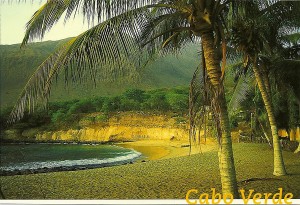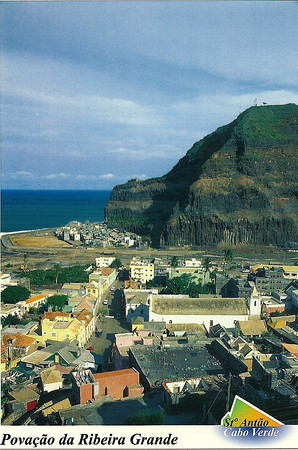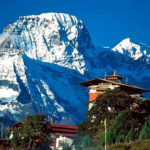(1)
Country Description
The Republic of Cape Verde is an island country, spanning an archipelago of 10 islands located in the central  Atlantic Ocean, 570 ams off the coast of Northwestern Africa.
Atlantic Ocean, 570 ams off the coast of Northwestern Africa.
The previously uninhabited islands were discovered and colonized by the Portuguese in the 15th Century, and became important in the Atlantic slave trade for their location. The islands’ prosperity often attracted privateers and pirates, including Sir Francis Drake, a corsair (privateer) under the authority of the British crown, who twice sacked the (then) capital Ribeira Grande, in the 1580s. The islands were also visited by Charles Darwin’s expedition in 1832.
The decline in the slave trade in the 19th century resulted in an economic crisis for the islands. With few natural resources, and without strong sustainable investment from the Portuguese, the citizens grew increasingly discontent with the colonial masters, who nevertheless refused to provide the local authorities with more autonomy. This discontent festered and culminated in 1975, when a movement originally led by Amílcar Cabral who was assassinated on 20 January 1973 then passed onto his half-brother Luís Cabral, achieved independence for the archipelago.
Politically, the country is a very stable democracy, with notable economic growth and improvements of living conditions despite its lack of natural resources, and has garnered international recognition by other countries and international organizations, which often provide development aid.
Tough economic times during the last decades of its colonization and the first years of Cape Verde’s independence led many to migrate to Europe, the Americas and other African countries. This migration was so significant that the number of Cape Verdeans and their descendants living abroad currently exceeds the population of Cape Verde itself.
Currently, the Cape Verdean economy is mostly service-oriented with a growing focus on tourism and foreign investment, which benefits from the islands’ warm climate throughout the year, diverse landscape, welcoming people and cultural richness, especially in music.
(2)
LGBT Life in Cape Verde
Since 2004, same-sex sexual acts are legal in Cape Verde. The age of consent is 16, equal with opposite-sex sexual activity.[citation needed. The previous law called for fines supervision for first time offenders, while repeat offenders would face imprisonment.
The U.S. Department of State‘s 2010 Human Rights Report found that “legal provisions helped provide protection for homosexual conduct; however, societal discrimination based on sexual orientation or gender identity continued to be a problem. There were no lesbian, gay, bisexual, or transgender persons’ organizations active in the country.”
(3)
Homosexuality in Cape Verde
By Ivalindo, native of Cape Verde
From his blog ‘Portraits of Life’
12/01/2010
Translated from Portuguese
After some time off this space, and this time with a theme, which in essence will bring some controversy because of its nature, certainty and being ready to listen to and even lead to consequences that it may arise. However the intention is not just bring my opinion but to make an analysis of situations that are real and can no longer cover the sun with a sieve, to escape a social reality. (Gay) people want to manifest or express themselves without shame, and as for me, in fact I see no consideration which is so reluctant to show this.  It is true that we live in a society that typically and historically Catholic, making false conservatve claims that gay is portrayed in a cautious manner.
It is true that we live in a society that typically and historically Catholic, making false conservatve claims that gay is portrayed in a cautious manner.
What we want is not looking for the pros and cons, nor supporters of this cause. It is true that Cape Verde has a story, no less true that it is open to new ideas and mentality, the evolution of time, however difficult even assuming, however, clearly visible to the eyes of those who need it.
Each day presents a (gay) reality before the eyes of society, and as has been being prepared, or at least made efforts to discuss certain directives that parents, not only in the political, but educational, training itself. Homosexuality in Cape Verde is now seen in a less worrisome, almost indifferent manner. But to be indifferent turns circumstances away from our reality, which is more or less advantageous, Nevertheless, our reality will continue to increase .
In Cape Verde, we have a real sense, and expressions can be fit for fierce attack and in some cases to discriminate against sex of different options. For me, about discrimination I do not see to what extent my sexual orientation interferes with my life. I am not indifferent, nor am I putting fuel on the fire as you say out there.
What Cape Verde lives is a false conservatism for me, never new. What else makes people live in the closet, as they say, is not social acceptance but the self. Nobody gets out of the closet, but to hide or pretend that nothing happens is only a temporary situation that will change someday.
It’s not up to me to discuss and have no opinion on this. The reasons used by the phrase–behavioral deviation. The fact is while it remains indifferent to this reality nothing can be done until there is an actual change in social mentality. But the media itself does nothing, the makers of public opinion show a certain homophobia to speak in any detail. I recall an article published in ‘The Week’, which gave an account of someone who was assumed to be Gay, nationally spread; the story was only in the mouths of the people for day, then went into oblivion.
(4)
Cape Verde as a LGBT Destination
From: My Holigay.com
December 8th, 2010
The travel guide people at Lonely Planet have completed their list of the top 10 countries you should travel to in 2011. Gay and lesbian travelers will find one or two surprises in the list and also places which are more gay friendly than others.
Off the north west coast of Africa you will find Cape Verde, a beautiful island which is a mere speck on a world map. Close enough for European gay and lesbian tourist to reach and warm enough for almost year round travel.
A favorite destination for honeymooners, here you will find beaches mixing with mountains and vegetation. Gay and lesbian relationship were made legal in 2004 and gay and lesbian tourist will find most locals will either not say anything to you or will simply ignore the fact you are homosexual.
(The other nine countries chosen by Lonely Planet were: Albania, Brazil, Panama,Bulgaria, Vanuatu, Italy, Tanzania, Syria, Japan.)
(5)
Notes From a Gay Peace Corps Volunteer on Visiting Cape Verde
From: Jay Davidson, volunteer in Mauritania (teacher@jaydavidson.com)
Notes on visiting Cape Verde
A brief excerpt:
People look noticeably different here than on mainland Africa. Some men have earrings, tatoos, dreadlocks and other longer or unusual hair styles. Many men wear shorts. Women wear pants and much more revealing clothing. The attention to appearance is not as meticulous as it is in Dakar and Mauritania. There is more graffiti here, which is manifest in both spray painting and the plastering of posters. Overall, there is less smoking.
Young children and teenagers circulate freely in the streets, individually, in pairs, and in small groups. It is evident that this is a safe society, and they can move about without worry of being harmed.
…there are some residents in the northern islands who think of themselves as being part of Europe and the southern Cape Verdians as being part of Africa.
…Most of the activity in Santa Maria (a town on the island of Dal) is centered around the beach, where there are people SCUBA diving, sailing, windsurfing, paragliding, and in similar activities.
…Geek Corps (www.geekcorps.org) This is a group of Information Technology experts who are volunteering their time worldwide to help in computer-related work. (Read more)
(6)
Best Dancer in Cape Verde, a Gay Guy
Going from the city to rural Cape Verde requires some serious choreography when it comes to dating and socializing.
By Raque Kunz, Peace Corps volunteer
Rincon, Cape Verde
April 2005
Among Raque Kinz’s comments about social life in Cape Verde is this observation: “A good dancer automatically commands respect. In my village the best dancer was a gay man. Although gay men in Cape Verde are traditionally shunned, this man’s dancing prowess made him incredibly popular, especially with women. He was invited to every party.”
After this, Raque says nothing more about LGBT issues since he was more intrigued by heterosexual dating traditions.
















